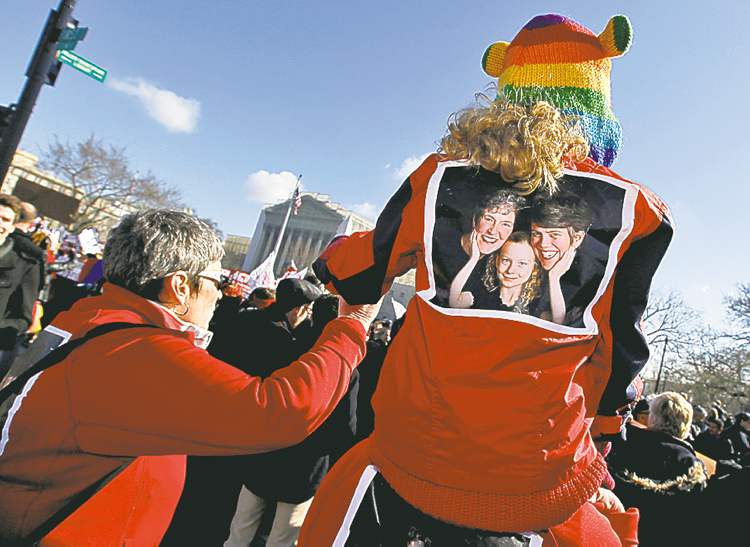Court could pass on gay-marriage ruling
Advertisement
Read this article for free:
or
Already have an account? Log in here »
To continue reading, please subscribe:
Monthly Digital Subscription
$0 for the first 4 weeks*
- Enjoy unlimited reading on winnipegfreepress.com
- Read the E-Edition, our digital replica newspaper
- Access News Break, our award-winning app
- Play interactive puzzles
*No charge for 4 weeks then price increases to the regular rate of $19.95 plus GST every four weeks. Offer available to new and qualified returning subscribers only. Cancel any time.
Monthly Digital Subscription
$4.99/week*
- Enjoy unlimited reading on winnipegfreepress.com
- Read the E-Edition, our digital replica newspaper
- Access News Break, our award-winning app
- Play interactive puzzles
*Billed as $19.95 plus GST every four weeks. Cancel any time.
To continue reading, please subscribe:
Add Free Press access to your Brandon Sun subscription for only an additional
$1 for the first 4 weeks*
*Your next subscription payment will increase by $1.00 and you will be charged $16.99 plus GST for four weeks. After four weeks, your payment will increase to $23.99 plus GST every four weeks.
Read unlimited articles for free today:
or
Already have an account? Log in here »
Hey there, time traveller!
This article was published 27/03/2013 (4670 days ago), so information in it may no longer be current.
WASHINGTON — The U.S. Supreme Court suggested Tuesday it could find a way out of the closely watched case over California’s ban on same-sex marriage without issuing a major national ruling on whether gays have a right to marry. One wary justice described the issue as newer than cellphones and the Internet.
This week’s arguments in two gay-marriage cases have drawn intense national interest as momentum rapidly swings toward acceptance of the issue among Americans. No state even recognized same-sex unions before 2003. Dozens of people lined up for days for the chance to observe what they expected to be a historic event, and thousands marched outside Tuesday, loudly claiming one side or the other.
The court’s first major examination of gay rights in 10 years continues today, when it will hear the first challenge it has accepted to the 1996 federal Defence of Marriage Act, which defines marriage as a union between a man and a woman. Former U.S. president Bill Clinton signed it into law but has recently spoken publicly against it. The law forbids nationwide recognition of same-sex marriages and bars married gay and lesbian couples from receiving federal benefits.

U.S. President Barack Obama has been increasingly vocal in support of gay rights after coming out on the issue during last year’s presidential race, and his administration has weighed in on behalf of the two same-sex couples who brought the California case.
There is no guarantee the conservative-leaning Supreme Court will rule in a similar direction, and justices hinted Tuesday they would not make a broad ruling on so new an issue. The case could produce a number of rulings, ranging from upholding the California ban to striking it down in a fashion that would erase such bans nationwide. The court is not expected to rule before late June.
Opponents of gay marriage have expressed confidence the justices will rule their way, and even some gay-rights activists have worried the court has taken up the issue too soon. Supporters of same-sex marriage hope for a ruling that will be the 21st century equivalent of the court’s 1967 decision in Loving v. Virginia that struck down state bans on interracial marriage.
Several justices, including some liberals who seemed open to gay marriage, raised doubts the case was properly before them. Justice Anthony Kennedy, the potentially decisive swing vote on a closely divided court, suggested the court could dismiss the case with no ruling at all.
Such an outcome would almost certainly allow gay marriages to resume in California but would have no affect elsewhere. The court is considering a legal challenge to Proposition 8, the gay-marriage ban California voters approved five years ago. A federal appeals court struck down the ban.
Justice Samuel Alito appeared to advocate a cautious approach.
“You want us to step in and render a decision based on an assessment of the effects of this institution which is newer than cellphones or the Internet? I mean, we do not have the ability to see the future,” Alito said.
Kennedy said he feared the court would go into “uncharted waters” if it embraced arguments advanced by gay-marriage supporters. But lawyer Theodore Olson, representing two same-sex couples, said the court similarly ventured into the unknown in 1967 when it struck down bans on interracial marriage in 16 states.
Kennedy noted other countries had had interracial marriages for hundreds of years.
— The Associated Press


